A
Auto Express
Guest
Britain loves hot hatchbacks, and we’re now at the time of year when the pair we’ve assembled here are coming into their own.
The newest all-wheel-drive fast five-door on the block is the Audi S3, a tuned-up version of the firm’s regular family hatch with a high-power 2.0-litre turbo engine and four-wheel drive to deploy that grunt.
The S3 is now into its fourth generation and it has just arrived in late 2020 sporting some sharper styling upgrades, more in-car tech, and sophisticated mechanicals that make it an appealing premium hot hatch. However, it’s not short of rivals, with the Mercedes-AMG A 35 the Audi’s closest competitor.
Each of this pair makes more than 300bhp, while both use dual-clutch gearboxes and send their power to all four wheels, and are clothed in more aggressive-looking, but still practical five-door bodies.
On paper there’s barely a cigarette paper between them, so will this be replicated when we get the Audi and Mercedes out on the road and put them through the rigorous Auto Express road test? Despite the similarity in the two cars’ specifications, the results might surprise you, so read on to find out.
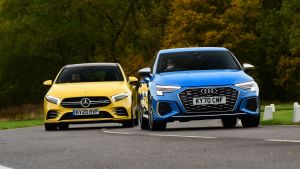
image
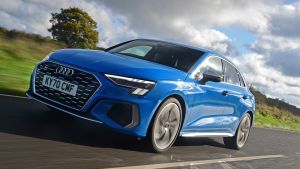
image
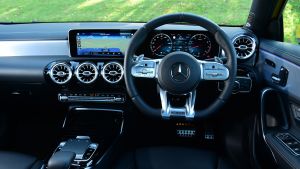
image
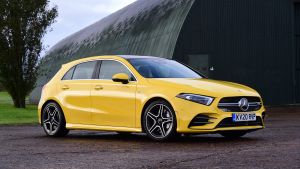
image
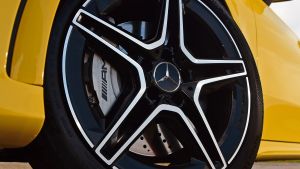
image
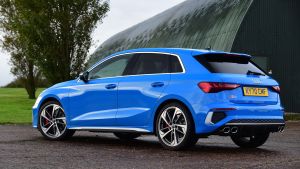
image
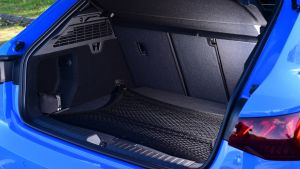
image
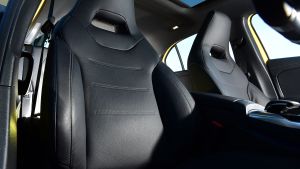
image
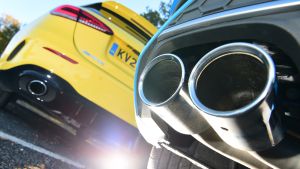
image
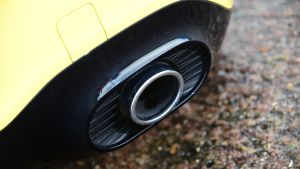
image
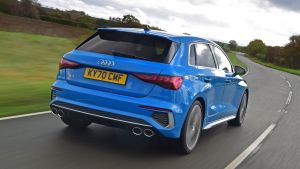
image
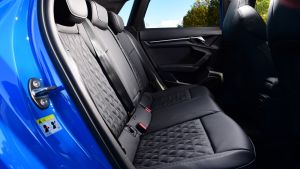
image
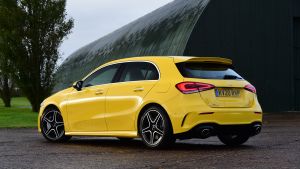
image
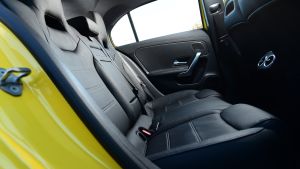
image
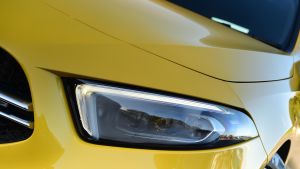
image
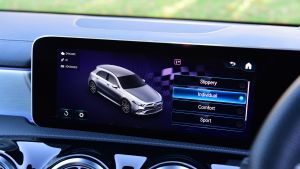
image
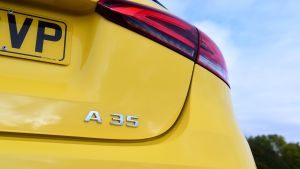
image
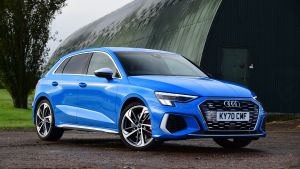
image
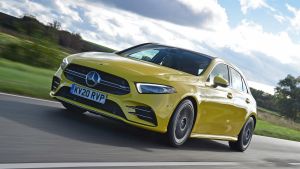
image
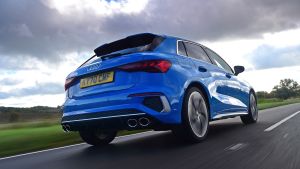
image
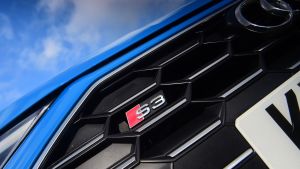
image
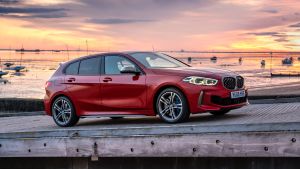
image
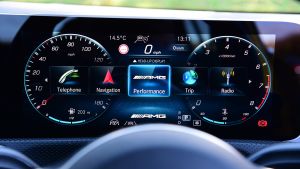
image
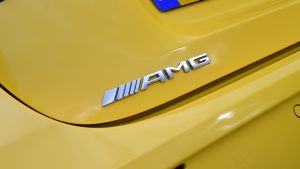
image
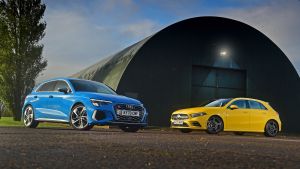
image
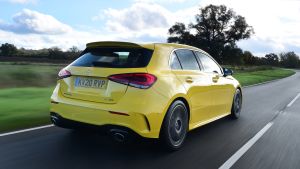
image
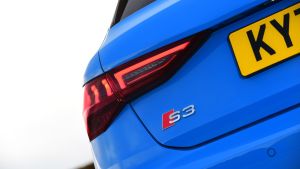
image
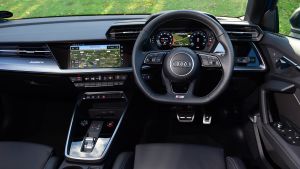
image
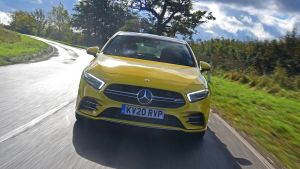
image
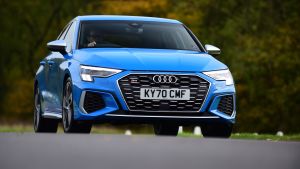
image
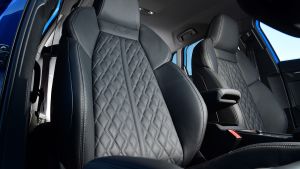
image
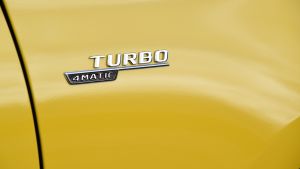
image
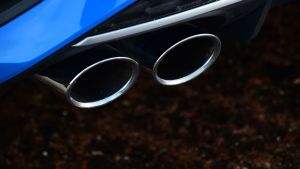
image
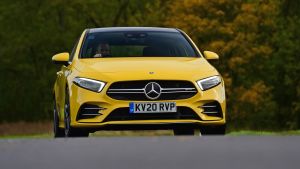
image
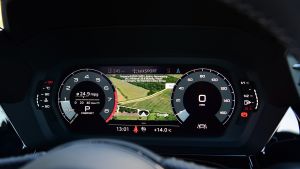
image
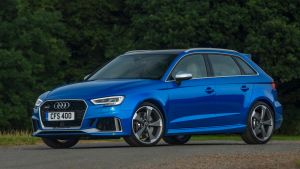
image
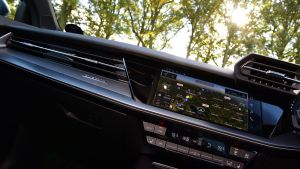
image
Design & engineering
The recipe for the new S3 isn’t dissimilar from its predecessor’s, with this car refining the formula. Priced from £37,900 in Sportback form, the S3 is slightly cheaper than the A 35, but is it better value?
Audi has taken an evolutionary approach to this S3, when it comes to both the design and the engineering. We’ll leave it up to you to decide whether you like the looks, but the reason it’s a familiar, albeit sharper shape than its predecessor is that, underneath, the S3 is still based on the brand’s MQB chassis architecture.
It’s 15mm lower than a regular A3, while the S3’s body has been optimised to aid aerodynamics and cooling too. Our car featured £770 optional 19-inch alloys, but S sports suspension is standard.
This uses MacPherson struts at the front and a multi-link set-up at the rear. This is because the S3 uses Audi’s quattro four-wheel-drive system, featuring a Haldex centre clutch that can send up to 100 per cent of the engine’s torque to the rear axle, according to Audi. In reality, the S3 is front-biased and feels like it rarely splits more than 50:50.
The brand’s familiar 2.0-litre TFSI four-cylinder turbo engine has been tweaked to deliver 305bhp and 400Nm here, and it drives a seven-speed dual-clutch automatic transmission.

image

image

image

image

image

image

image

image

image

image

image

image

image

image

image

image

image

image

image

image

image

image

image

image

image

image

image

image

image

image

image

image

image

image

image

image

image
The bigger development for this new S3 compared with its predecessor is inside. There’s a more digital focus, with two large and slick-looking screens.
However, while the Audi is £925 cheaper than the Mercedes, it also feels it. The cabin has gone down the digital route, and the tech Audi has installed feels premium, but the materials surrounding it don’t always match up. There is plenty of hard plastic and fewer surfaces feel as plush as those in the A 35.
Driving
these two cars are heavily focused on what they’re like to drive, yet unfortunately the S3 is neither as enjoyable nor as involving as the A 35.
Part of that is down to the engine, because while there is a broad spread of performance, the 2.0 TFSI motor feels hamstrung by WLTP rules. It’s not sharp enough to respond to inputs with the throttle, suffering just a little more lag than the Mercedes, and it doesn’t sound as characterful either.
We have no issue with the performance, though. With 0-62mph coming up in 4.8 seconds – helped by four-wheel-drive traction and launch control – the S3 is just 0.1 seconds slower than the A 35.
It’s basically impossible to feel this difference on the road, but it’s the more sluggish nature of the Audi compared with its rival that’s most obvious.

image

image

image

image

image

image

image

image

image

image

image

image

image

image

image

image

image

image

image

image

image

image

image

image

image

image

image

image

image

image

image

image

image

image

image

image

image
The engine is also at odds with the ride, because the set-up doesn’t reflect this relaxed feel. The way it deals with the typically torn, broken and rolling B-roads such cars need to excel on is less sophisticated, thumping and bumping more than the AMG.
It’s not as comfortable, then, nor is its body control quite as good, while the S3’s steering feels spongy and less clear in the messages it relays to its driver.
The gearbox also doesn’t shift with the same punch as the A 35’s dual-clutch. It’s a good automatic, slurring changes and shifting smoothly when you’re cruising, but it just doesn’t feel as immediate as it needs to be for this to be a successful hot hatch.
On passive dampers the different modes do little to change the car’s character, only adding steering weight in Dynamic, which isn’t a big benefit.
Practicality
However, these cars will likely be used as one vehicle to do many things, so practicality must come into it – but the S3 loses out here too, with a smaller boot.
Thanks to its rear differential, the S3 only offers 325 litres of boot space, 45 litres less than the A 35. It’s closer when it comes to room in the rear of the cabin, because access to both is easy and there’s enough space in the Audi’s back seats, but it doesn’t put clear distance between it and the Mercedes.
Storage is fine, but not exceptional, while visibility is good too. However, if you want a rear- view camera you’ll have to spend £865 as part of an option pack, whereas it’s standard on the Mercedes.
Ownership
Neither brand performed too well with owners in our 2020 Driver Power satisfaction survey. Audi finished 21st, which still isn’t a great result, but it was seven places ahead of Mercedes. In the eight main categories, Audi didn’t finish higher than 11th.
Still, as one car to cover many bases – one of which will likely be family transport for some of its owners – the S3 does offer plenty of safety, plus the reassurance of four-wheel drive and this performance model’s upgraded brakes.
Autonomous braking with pedestrian and cyclist detection is fitted as standard, alongside lane-keep assist. However, blind-spot warning only comes as part of a £510 pack and, if you want to add semi-autonomous adaptive cruise, you’ll have to splash out on the £1,750 Driver Assistance pack.
Running costs
If you’re after the kind of performance both of these two cars offer, you might understandably be prepared to take a slight hit on running costs. However, this pair must still be affordable to run.
Not only is the Audi a little cheaper, but our experts predict it’ll hold on to slightly more money after three years or 36,000 miles, with a predicted residual value of 57.8 per cent, which equates to depreciation of £16,001. This compares with a rating of 54.6 per cent retained value and depreciation of £17,646 for the A 35. While the majority will buy on finance rather than with cash, these figures are still important because they have a bearing on residual values, so they’ll affect monthly costs too.
Testers’ notes
“If you need more space than this S3 Sportback provides, then go for the saloon. It’s £565 more, but offers 100 litres more boot space, albeit there’s no big hatch, so carrying larger items could be trickier.”

image

image

image

image

image

image

image

image

image

image

image

image

image

image

image

image

image

image

image

image

image

image

image

image

image

image

image

image

image

image

image

image

image

image

image

image

image
Mercedes is a relative newcomer at this level of the hot hatch market, but the £38,825 AMG-tuned A 35 is a talented machine. Does its ability run deep enough to overpower Audi’s new S3?
Design & engineering
Like the S3, this A 35 was baked into the product plan from the start, along with the forthcoming Audi RS 3 and the current Mercedes-AMG A 45 S, which represent the range-toppers in their respective line-ups.
Here, AMG’s 2.0-litre four-cylinder turbocharged engine produces slightly less power than the S3, at 302bhp, but an identical 400Nm of torque. An extra 80kg in the kerb weight (1,500kg plays 1,580kg) could also affect performance and handling.
However, the differences are small, while the AMG uses a seven-speed dual-clutch box sending power to all four wheels. Like the Audi, in everyday use the AMG is generally front-wheel drive, but if the system detects some slip then it can send up to 50 per cent of the engine’s torque to the rear axle. This feels about right, whereas the Audi never feels like it sends more than 50 per cent of the claimed 100 per cent of torque it can shuffle to the rear.

image

image

image

image

image

image

image

image

image

image

image

image

image

image

image

image

image

image

image

image

image

image

image

image

image

image

image

image

image

image

image

image

image

image

image

image

image
That four-wheel-drive system is possible thanks to a multi-link rear suspension system and MacPherson struts at the front. As on the S3, you can opt for adaptive dampers in the Premium Plus pack, but this is a pricey £6,435 mix that also adds 19-inch alloys (18s are standard), matrix LED lights and an aero kit.
There are driving modes, as with the Audi, highlighting just how similar these cars are in approach. In the Mercedes your choice is Slippery, Comfort, Sport, Sport+ and Individual; in the Audi it’s Efficiency, Comfort, Auto, Dynamic and Individual. The different settings have more affect in the A 35.
Inside, the Merc feels higher in quality. There are more plush materials, and where the soft-touch stuff runs out, the plastics are more premium. The design feels fresher, even though the Audi is a newer car.
Driving
The A 35 feels much more alert than the A3 on the move – and more fun. In every area it’s just a little more engaging, starting with the steering.
You can change the car’s character with the different driving modes, but no matter which setting you’re in, the Merc’s steering feels more direct and less spongy, less artificial. It gives you more faith and a better connection to the front wheels.
The engine too has more personality. Thanks to its launch control system and superb traction, the A 35 will sprint from 0-62mph in 4.7 seconds, making it 0.1 seconds faster than the S3.

image

image

image

image

image

image

image

image

image

image

image

image

image

image

image

image

image

image

image

image

image

image

image

image

image

image

image

image

image

image

image

image

image

image

image

image

image
It’s difficult to split the two on ultimate grip and agility, but the way the Mercedes handles makes it feel keener and more alive. The standard passive dampers control the body better, keeping the A 35’s chassis more stable and composed, yet they also offer more comfort away from twisty, involving roads. As a result, the Mercedes is the car with a bigger breadth of ability and a larger operating window.
Refinement is fine. There’s maybe a little more road noise than in the S3, but you can forgive the A 35 this given the benefits elsewhere, while the gearbox is just as good as an automatic and slightly snappier to shift in manual mode. The real metal shift paddles feel nicer and work with a more satisfying click, too. Then there’s the noise and how the A 35 makes you feel compared with the S3.
Practicality
At 370 litres, the Mercedes’ boot is larger than the Audi’s, by 45 litres. Its wheelbase is slightly longer, too, which no doubt helps packaging, while the A 35 is less affected by the addition of a rear differential.
There’s roughly the same amount of room in the rear seats and certainly enough for children; even adults will be fine on longer trips.
Given that these cars are about fun and driver involvement, the driving positions are important, as is the support the seats offer. In the Mercedes you can get slightly lower, and although the sporty seats in both offer a good amount of cushioning and support, it’s the Audi’s that offer more of the latter and grip you better during hard cornering.
Visibility is fine in both cars, but while they do get parking sensors as standard, only the A 35 has a reversing camera. It’s part of an £865 pack in the S3.
Ownership
There’s also an adequate level of safety kit, with autonomous braking and lane-keep assist as standard. However, unlike with the Audi you can’t just easily upgrade the A 35’s safety systems to add blind-spot warning.
Instead, you’ll have to go for the Premium Plus pack – a whopping £6,435 extra – before adding the £1,495 Driving Assistance Pack, which brings blind-spot assist, cross-traffic alert and lane-change assist.
The A-Class achieved a full five-star Euro NCAP rating back in 2018 and, like the S3, with four-wheel-drive traction and uprated brakes, it should give owners peace of mind at this time of year.
However, the ownership proposition is dented by poor results in our Driver Power survey for Mercedes, which finished in 28th position overall. Its dealers took 15th place, clawing a little ground back on Audi, whose franchises took 20th spot.
Running costs
The A 35 wasn’t quite as efficient on test as the S3. The AMG returned 27.0mpg for an annual fuel bill (over 12,000 miles) of £2,324, compared with £2,134 for the S3, which managed 29.2mpg.
The A 35 will be slightly cheaper to insure for our sample driver, at £836 per year compared with £876 for the S3, yet the Audi’s maintenance is a little cheaper: £22 per month next to the Merc’s £30.
Testers’ notes
“You can upgrade the A 35’s looks with a more aggressive aero package, including a prominent splitter, front bumper flicks and a rear wing, but it only comes as part of the Premium Plus pack.”
First place: Mercedes-AMG A 35

image

image

image

image

image

image

image

image

image

image

image

image

image

image

image

image

image

image

image

image

image

image

image

image

image

image

image

image

image

image

image

image

image

image

image

image

image
Dynamically, the A 35 edges the S3. Performance and grip are similar, but the way the AMG involves you makes it a more enjoyable car to drive, with sweeter steering and more composed damping, while it’s also more practical than the Audi. It’s hard to split the pair on tech, although the A 35 gets a bit more kit. However, while it’ll be slightly costlier to run, we think that’s a price worth paying.
Second place: Audi S3

image

image

image

image

image

image

image

image

image

image

image

image

image

image

image

image

image

image

image

image

image

image

image

image

image

image

image

image

image

image

image

image

image

image

image

image

image
The S3 is proof that a car is more than the sum of its parts. Performance is fine, there’s good grip, and traction is great thanks to four-wheel drive, yet the S3 fails to deliver the fun a high-power hatch should. It’ll be slightly cheaper to run, while the on-board tech is sound, but the lack of sparkle combined with slightly less practicality means it can’t overcome the AMG in this contest.
BMW M135i

image

image

image

image

image

image

image

image

image

image

image

image

image

image

image

image

image

image

image

image

image

image

image

image

image

image

image

image

image

image

image

image

image

image

image

image

image
With 302bhp from its 2.0-litre turbo four-cylinder engine, four-wheel drive helping to serve up a 4.8-second 0-62mph time, and plenty of agility, BMW’s hot hatch makes an interesting alternative that boasts sound tech and practicality, too.
Audi RS 3

image

image

image

image

image

image

image

image

image

image

image

image

image

image

image

image

image

image

image

image

image

image

image

image

image

image

image

image

image

image

image

image

image

image

image

image

image
If the S3 isn’t exciting enough for you, a used RS 3 might tick that box. The 395bhp five-cylinder engine sounds lovely and there’s huge performance and great traction. While the previous A3 might not look as modern inside, the tech is still slick.
Figures
Continue reading...
The newest all-wheel-drive fast five-door on the block is the Audi S3, a tuned-up version of the firm’s regular family hatch with a high-power 2.0-litre turbo engine and four-wheel drive to deploy that grunt.
- SEE MORE Best hot hatchbacks 2020/2021
The S3 is now into its fourth generation and it has just arrived in late 2020 sporting some sharper styling upgrades, more in-car tech, and sophisticated mechanicals that make it an appealing premium hot hatch. However, it’s not short of rivals, with the Mercedes-AMG A 35 the Audi’s closest competitor.
Each of this pair makes more than 300bhp, while both use dual-clutch gearboxes and send their power to all four wheels, and are clothed in more aggressive-looking, but still practical five-door bodies.
On paper there’s barely a cigarette paper between them, so will this be replicated when we get the Audi and Mercedes out on the road and put them through the rigorous Auto Express road test? Despite the similarity in the two cars’ specifications, the results might surprise you, so read on to find out.
Audi S3

image

image

image

image

image

image

image

image

image

image

image

image

image

image

image

image

image

image

image

image

image

image

image

image

image

image

image

image

image

image

image

image

image

image

image

image

image
| Audi S3 Sportback S tronic | |
| Price: | £37,900 |
| Engine: | 2.0-litre 4cyl turbo, 305bhp |
| 0-62mph: | 4.8 seconds |
| Test economy: | 29.4mpg/6.5mpl |
| CO2: | 183g/km |
| Annual road tax: | £150 |
Design & engineering
The recipe for the new S3 isn’t dissimilar from its predecessor’s, with this car refining the formula. Priced from £37,900 in Sportback form, the S3 is slightly cheaper than the A 35, but is it better value?
Audi has taken an evolutionary approach to this S3, when it comes to both the design and the engineering. We’ll leave it up to you to decide whether you like the looks, but the reason it’s a familiar, albeit sharper shape than its predecessor is that, underneath, the S3 is still based on the brand’s MQB chassis architecture.
It’s 15mm lower than a regular A3, while the S3’s body has been optimised to aid aerodynamics and cooling too. Our car featured £770 optional 19-inch alloys, but S sports suspension is standard.
This uses MacPherson struts at the front and a multi-link set-up at the rear. This is because the S3 uses Audi’s quattro four-wheel-drive system, featuring a Haldex centre clutch that can send up to 100 per cent of the engine’s torque to the rear axle, according to Audi. In reality, the S3 is front-biased and feels like it rarely splits more than 50:50.
The brand’s familiar 2.0-litre TFSI four-cylinder turbo engine has been tweaked to deliver 305bhp and 400Nm here, and it drives a seven-speed dual-clutch automatic transmission.

image

image

image

image

image

image

image

image

image

image

image

image

image

image

image

image

image

image

image

image

image

image

image

image

image

image

image

image

image

image

image

image

image

image

image

image

image
The bigger development for this new S3 compared with its predecessor is inside. There’s a more digital focus, with two large and slick-looking screens.
However, while the Audi is £925 cheaper than the Mercedes, it also feels it. The cabin has gone down the digital route, and the tech Audi has installed feels premium, but the materials surrounding it don’t always match up. There is plenty of hard plastic and fewer surfaces feel as plush as those in the A 35.
Driving
these two cars are heavily focused on what they’re like to drive, yet unfortunately the S3 is neither as enjoyable nor as involving as the A 35.
Part of that is down to the engine, because while there is a broad spread of performance, the 2.0 TFSI motor feels hamstrung by WLTP rules. It’s not sharp enough to respond to inputs with the throttle, suffering just a little more lag than the Mercedes, and it doesn’t sound as characterful either.
We have no issue with the performance, though. With 0-62mph coming up in 4.8 seconds – helped by four-wheel-drive traction and launch control – the S3 is just 0.1 seconds slower than the A 35.
It’s basically impossible to feel this difference on the road, but it’s the more sluggish nature of the Audi compared with its rival that’s most obvious.

image

image

image

image

image

image

image

image

image

image

image

image

image

image

image

image

image

image

image

image

image

image

image

image

image

image

image

image

image

image

image

image

image

image

image

image

image
The engine is also at odds with the ride, because the set-up doesn’t reflect this relaxed feel. The way it deals with the typically torn, broken and rolling B-roads such cars need to excel on is less sophisticated, thumping and bumping more than the AMG.
It’s not as comfortable, then, nor is its body control quite as good, while the S3’s steering feels spongy and less clear in the messages it relays to its driver.
The gearbox also doesn’t shift with the same punch as the A 35’s dual-clutch. It’s a good automatic, slurring changes and shifting smoothly when you’re cruising, but it just doesn’t feel as immediate as it needs to be for this to be a successful hot hatch.
On passive dampers the different modes do little to change the car’s character, only adding steering weight in Dynamic, which isn’t a big benefit.
Practicality
However, these cars will likely be used as one vehicle to do many things, so practicality must come into it – but the S3 loses out here too, with a smaller boot.
Thanks to its rear differential, the S3 only offers 325 litres of boot space, 45 litres less than the A 35. It’s closer when it comes to room in the rear of the cabin, because access to both is easy and there’s enough space in the Audi’s back seats, but it doesn’t put clear distance between it and the Mercedes.
Storage is fine, but not exceptional, while visibility is good too. However, if you want a rear- view camera you’ll have to spend £865 as part of an option pack, whereas it’s standard on the Mercedes.
Ownership
Neither brand performed too well with owners in our 2020 Driver Power satisfaction survey. Audi finished 21st, which still isn’t a great result, but it was seven places ahead of Mercedes. In the eight main categories, Audi didn’t finish higher than 11th.
Still, as one car to cover many bases – one of which will likely be family transport for some of its owners – the S3 does offer plenty of safety, plus the reassurance of four-wheel drive and this performance model’s upgraded brakes.
Autonomous braking with pedestrian and cyclist detection is fitted as standard, alongside lane-keep assist. However, blind-spot warning only comes as part of a £510 pack and, if you want to add semi-autonomous adaptive cruise, you’ll have to splash out on the £1,750 Driver Assistance pack.
Running costs
If you’re after the kind of performance both of these two cars offer, you might understandably be prepared to take a slight hit on running costs. However, this pair must still be affordable to run.
Not only is the Audi a little cheaper, but our experts predict it’ll hold on to slightly more money after three years or 36,000 miles, with a predicted residual value of 57.8 per cent, which equates to depreciation of £16,001. This compares with a rating of 54.6 per cent retained value and depreciation of £17,646 for the A 35. While the majority will buy on finance rather than with cash, these figures are still important because they have a bearing on residual values, so they’ll affect monthly costs too.
Testers’ notes
“If you need more space than this S3 Sportback provides, then go for the saloon. It’s £565 more, but offers 100 litres more boot space, albeit there’s no big hatch, so carrying larger items could be trickier.”
Mercedes-AMG A 35

image

image

image

image

image

image

image

image

image

image

image

image

image

image

image

image

image

image

image

image

image

image

image

image

image

image

image

image

image

image

image

image

image

image

image

image

image
| Mercedes-AMG A 35 4 Matic | |
| Price: | £38,825 |
| Engine: | 2.0-litre 4cyl turbo, 302bhp |
| 0-62mph: | 4.7 seconds |
| Test economy: | 27.0mpg/5.9mpl |
| CO2: | 184g/km |
| Annual road tax: | £150 |
Mercedes is a relative newcomer at this level of the hot hatch market, but the £38,825 AMG-tuned A 35 is a talented machine. Does its ability run deep enough to overpower Audi’s new S3?
Design & engineering
Like the S3, this A 35 was baked into the product plan from the start, along with the forthcoming Audi RS 3 and the current Mercedes-AMG A 45 S, which represent the range-toppers in their respective line-ups.
Here, AMG’s 2.0-litre four-cylinder turbocharged engine produces slightly less power than the S3, at 302bhp, but an identical 400Nm of torque. An extra 80kg in the kerb weight (1,500kg plays 1,580kg) could also affect performance and handling.
However, the differences are small, while the AMG uses a seven-speed dual-clutch box sending power to all four wheels. Like the Audi, in everyday use the AMG is generally front-wheel drive, but if the system detects some slip then it can send up to 50 per cent of the engine’s torque to the rear axle. This feels about right, whereas the Audi never feels like it sends more than 50 per cent of the claimed 100 per cent of torque it can shuffle to the rear.

image

image

image

image

image

image

image

image

image

image

image

image

image

image

image

image

image

image

image

image

image

image

image

image

image

image

image

image

image

image

image

image

image

image

image

image

image
That four-wheel-drive system is possible thanks to a multi-link rear suspension system and MacPherson struts at the front. As on the S3, you can opt for adaptive dampers in the Premium Plus pack, but this is a pricey £6,435 mix that also adds 19-inch alloys (18s are standard), matrix LED lights and an aero kit.
There are driving modes, as with the Audi, highlighting just how similar these cars are in approach. In the Mercedes your choice is Slippery, Comfort, Sport, Sport+ and Individual; in the Audi it’s Efficiency, Comfort, Auto, Dynamic and Individual. The different settings have more affect in the A 35.
Inside, the Merc feels higher in quality. There are more plush materials, and where the soft-touch stuff runs out, the plastics are more premium. The design feels fresher, even though the Audi is a newer car.
Driving
The A 35 feels much more alert than the A3 on the move – and more fun. In every area it’s just a little more engaging, starting with the steering.
You can change the car’s character with the different driving modes, but no matter which setting you’re in, the Merc’s steering feels more direct and less spongy, less artificial. It gives you more faith and a better connection to the front wheels.
The engine too has more personality. Thanks to its launch control system and superb traction, the A 35 will sprint from 0-62mph in 4.7 seconds, making it 0.1 seconds faster than the S3.

image

image

image

image

image

image

image

image

image

image

image

image

image

image

image

image

image

image

image

image

image

image

image

image

image

image

image

image

image

image

image

image

image

image

image

image

image
It’s difficult to split the two on ultimate grip and agility, but the way the Mercedes handles makes it feel keener and more alive. The standard passive dampers control the body better, keeping the A 35’s chassis more stable and composed, yet they also offer more comfort away from twisty, involving roads. As a result, the Mercedes is the car with a bigger breadth of ability and a larger operating window.
Refinement is fine. There’s maybe a little more road noise than in the S3, but you can forgive the A 35 this given the benefits elsewhere, while the gearbox is just as good as an automatic and slightly snappier to shift in manual mode. The real metal shift paddles feel nicer and work with a more satisfying click, too. Then there’s the noise and how the A 35 makes you feel compared with the S3.
Practicality
At 370 litres, the Mercedes’ boot is larger than the Audi’s, by 45 litres. Its wheelbase is slightly longer, too, which no doubt helps packaging, while the A 35 is less affected by the addition of a rear differential.
There’s roughly the same amount of room in the rear seats and certainly enough for children; even adults will be fine on longer trips.
Given that these cars are about fun and driver involvement, the driving positions are important, as is the support the seats offer. In the Mercedes you can get slightly lower, and although the sporty seats in both offer a good amount of cushioning and support, it’s the Audi’s that offer more of the latter and grip you better during hard cornering.
Visibility is fine in both cars, but while they do get parking sensors as standard, only the A 35 has a reversing camera. It’s part of an £865 pack in the S3.
Ownership
There’s also an adequate level of safety kit, with autonomous braking and lane-keep assist as standard. However, unlike with the Audi you can’t just easily upgrade the A 35’s safety systems to add blind-spot warning.
Instead, you’ll have to go for the Premium Plus pack – a whopping £6,435 extra – before adding the £1,495 Driving Assistance Pack, which brings blind-spot assist, cross-traffic alert and lane-change assist.
The A-Class achieved a full five-star Euro NCAP rating back in 2018 and, like the S3, with four-wheel-drive traction and uprated brakes, it should give owners peace of mind at this time of year.
However, the ownership proposition is dented by poor results in our Driver Power survey for Mercedes, which finished in 28th position overall. Its dealers took 15th place, clawing a little ground back on Audi, whose franchises took 20th spot.
Running costs
The A 35 wasn’t quite as efficient on test as the S3. The AMG returned 27.0mpg for an annual fuel bill (over 12,000 miles) of £2,324, compared with £2,134 for the S3, which managed 29.2mpg.
The A 35 will be slightly cheaper to insure for our sample driver, at £836 per year compared with £876 for the S3, yet the Audi’s maintenance is a little cheaper: £22 per month next to the Merc’s £30.
Testers’ notes
“You can upgrade the A 35’s looks with a more aggressive aero package, including a prominent splitter, front bumper flicks and a rear wing, but it only comes as part of the Premium Plus pack.”
Verdict
First place: Mercedes-AMG A 35

image

image

image

image

image

image

image

image

image

image

image

image

image

image

image

image

image

image

image

image

image

image

image

image

image

image

image

image

image

image

image

image

image

image

image

image

image
Dynamically, the A 35 edges the S3. Performance and grip are similar, but the way the AMG involves you makes it a more enjoyable car to drive, with sweeter steering and more composed damping, while it’s also more practical than the Audi. It’s hard to split the pair on tech, although the A 35 gets a bit more kit. However, while it’ll be slightly costlier to run, we think that’s a price worth paying.
Second place: Audi S3

image

image

image

image

image

image

image

image

image

image

image

image

image

image

image

image

image

image

image

image

image

image

image

image

image

image

image

image

image

image

image

image

image

image

image

image

image
The S3 is proof that a car is more than the sum of its parts. Performance is fine, there’s good grip, and traction is great thanks to four-wheel drive, yet the S3 fails to deliver the fun a high-power hatch should. It’ll be slightly cheaper to run, while the on-board tech is sound, but the lack of sparkle combined with slightly less practicality means it can’t overcome the AMG in this contest.
Also consider...
BMW M135i

image

image

image

image

image

image

image

image

image

image

image

image

image

image

image

image

image

image

image

image

image

image

image

image

image

image

image

image

image

image

image

image

image

image

image

image

image
- Model: BMW M135i xDrive
- Price: £37,470
- Engine: 2.0-litre 4cyl, 302bhp
With 302bhp from its 2.0-litre turbo four-cylinder engine, four-wheel drive helping to serve up a 4.8-second 0-62mph time, and plenty of agility, BMW’s hot hatch makes an interesting alternative that boasts sound tech and practicality, too.
Audi RS 3

image

image

image

image

image

image

image

image

image

image

image

image

image

image

image

image

image

image

image

image

image

image

image

image

image

image

image

image

image

image

image

image

image

image

image

image

image
- Model: Audi RS 3 Sportback
- Price: £39,750
- Engine: 2.5-litre 5cyl, 395bhp
If the S3 isn’t exciting enough for you, a used RS 3 might tick that box. The 395bhp five-cylinder engine sounds lovely and there’s huge performance and great traction. While the previous A3 might not look as modern inside, the tech is still slick.
Figures
| Mercedes-AMG A 35 4MATIC | Audi S3 Sportback S tronic | |
| Price/as tested | £38,825/£41,920 | £37,900/£38,985 |
| Residual value (after 3yrs/36,000) | £21,179/54.6% | £21,899/57.8% |
| Depreciation | £17,646 | £16,001 |
| Annual tax liability std/higher rate | £2,805/£5,609 | £2,736/£5,472 |
| Annual fuel cost (12k/20k miles) | £2,324/£3,873 | £2,134/£3,556 |
| Ins. group/quote/VED | 35/£836/£150 | 34/£871/£150 |
| Cost of 1st/2nd/3rd service | £30pm (3yrs) | £22pm (2yrs) |
| Length/wheelbase | 4,436/2,729mm | 4,351/2,630mm |
| Height/width | 1,405/1,796mm | 1,438/1,816mm |
| Engine | 4cyl in-line/1,991cc | 4cyl in-line/1,984cc |
| Peak power/revs | 302/5,800 bhp/rpm | 306/5,450 bhp/rpm |
| Peak torque/revs | 400/3,000 Nm/rpm | 400/2,000 Nm/rpm |
| Transmission | 7-spd DCT/4wd | 7-spd DCT/4wd |
| Fuel tank capacity/spare wheel | 51 litres/repair kit | 55 litres/repair kit |
| Boot capacity (seats up/down) | 370/1,210 litres | 325/1,145 litres |
| Kerbweight/payload/towing weight | 1,580/490/N/Akg | 1,500/520/N/Akg |
| Turning circle | 11.5 metres | 11.1 metres |
| Basic warranty/recovery | 3yrs (unlimited)/3yrs | 3yrs (60,000)/3yrs |
| Driver Power manufacturer/dealer pos | 28th/15th | 21st/20th |
| NCAP: Adult/child/ped./assist/stars | 96/91/92/75/5 (’18) | TBC |
| 0-62mph/top speed | 4.7 secs/155mph | 4.8 secs/155mph |
| Auto Express economy/range | 27.0mpg/303 miles | 29.4mpg/356 miles |
| WLTP combined | 33.2-34.9mpg | 34.4-34.9mpg |
| WLTP combined | 7.3-7.7mpl | 7.6-7.7mpl |
| Actual/claimed CO2/tax bracket | 242/184g/km/37% | 222/183g/km/37% |
| Airbags/Isofix/parking sensors/camera | Eight/yes/yes/yes | £145/yes/yes |
| Auto box/lane keep/blind spot/AEB | Yes/yes/no/yes | Eight/yes/yes/£865* |
| Climate/cruise/leather/heated seats | Yes/yes/yes/yes | Yes/yes/£510*/yes |
| Met paint/LEDs/keyless/pwr tailgate | £595/no/£2,935*/no | Yes/yes/yes/yes |
| Sat-nav/digital dash/DAB/apps | Yes/yes/yes/yes | £575/yes/£425/£345 |
| Wireless/CarPlay/Android Auto | Yes/yes/yes | Yes/yes/yes/yes |
Continue reading...
